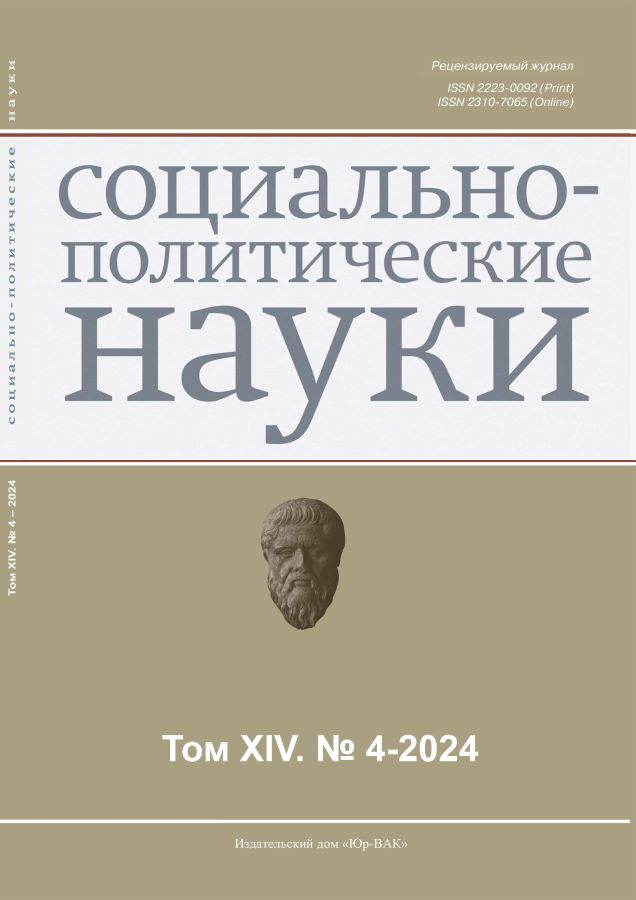Practice of managing social role in a smart city using marketplaces as an example
- Authors: Garaganov A.V.1
-
Affiliations:
- Financial University under the Government of the Russian Federation
- Issue: Vol 14, No 4 (2024)
- Pages: 177-185
- Section: Sociology of management
- URL: https://journals.eco-vector.com/2223-0092/article/view/651478
- DOI: https://doi.org/10.33693/2223-0092-2024-14-4-177-185
- EDN: https://elibrary.ru/PFLPTK
- ID: 651478
Cite item
Abstract
The article is devoted to the study of social role management in the context of smart city development, where the integration of information and communication technologies and the Internet of Things transforms urban spaces and social interactions. The study emphasizes the importance of social roles that, by adapting to new technological conditions, improve the quality of life and sustainability of urban communities. Using the example of the growth of new residential complexes, it is shown how the introduction of intelligent technologies through the opening of marketplace order pick-up points redefines social roles, stimulating public participation and joint decision-making. Technological growth also gives rise to challenges related to social mobility and the convenience of technologies for citizens. The management of social roles requires strategies that create inclusiveness and sustainability. The role of citizen interaction platforms and the digitalization of urban infrastructure are noted, which optimizes the use of resources and reduces social tension. The need for an adaptive program of cooperation between local producers and institutions to introduce new social roles in the context of smart city development is emphasized.
Full Text
About the authors
Artur V. Garaganov
Financial University under the Government of the Russian Federation
Author for correspondence.
Email: arturcompany21@gmail.com
ORCID iD: 0000-0002-7886-2896
SPIN-code: 6780-5644
researcher, Center “Locomotives of Growth”, Department of Sociology
Russian Federation, MoscowReferences
- Vershinina I.A. Modern theories of the city: A sociological analysis: Monograph. Moscow: Canon + ROOI “Rehabilitation”, 2019. 240 p.
- Garaganov A.V. How intelligent technologies change the society and space of a big city. Sociopolitical Sciences. 2024. Vol. 14. No. 1. Pp. 96–101. (In Rus.). doi: 10.33693/2223-0092-2024-14-1-96-101. EDN: COODXI.
- Garaganov A.V. Public perception of the risks of using intelligent technologies in digital management of a modern city. Sociopolitical Sciences. 2024. Vol. 14. No. 3. Pp. 143–149. (In Rus.). doi: 10.33693/2223-0092-2024-14-3-143-149. EDN: KWAUAG.
- Garaganov A.V. Development of the potential of intelligent technologies in security management of a modern city. Sociopolitical Sciences. 2024. Vol. 14. No. 2. Pp. 177–182. (In Rus.). doi: 10.33693/2223-0092-2024-14-2-177-182. EDN: HPDXXW.
- Garaganov A.V. Neurosociology: The influence of artificial intelligence on social dynamics. Modern Education: Traditions and Innovations. 2023. No. 4. Pp. 124–127. (In Rus.). doi: 10.51623/23132027.2304.124. EDN: JSFLBJ.
- Bauman Z. Liquid modernity. S.A. Komarov (transl. from English). St. Petersburg: Piter, 2008. 238 p. ISBN: 978-5-469-00034-1. EDN: QOABEJ.
- Vershinina I.A., Polyakova N.L. Moscow: The capital – the global city – the agglomeration. Bulletin of Moscow University. Series 18: Sociology and Political Science. 2014. No. 4. Pp. 122–137. (In Rus.). EDN: TEDGZH.
- Wirth L. Urbanism as a way of life. In: Selected works on sociology: Collection of translations. V.G. Nikolaev (transl. from English). L.V. Girko (ed.). Moscow, 2005. Pp. 89–113. EDN: NDRSEJ.
- Gehl J., Gemzo L. New urban spaces. O. Pobortseva (transl. from English). 3rd ed. Moscow: Concern Krost, 2012. 263 p. ISBN: 978-5-9614-1937-5. EDN: QNQBIF.
- Park R., Bankovskaya S. The city as a social laboratory. Sociological Review. 2002. Vol. 2. No. 3. Pp. 3–12. (In Rus.). EDN: TWMRNL.
- Sennett R. Capitalism in the big city: Globalization, flexibility and indifference. Logos. 2008. No. 3 (66). Pp. 95–107. (In Rus.). EDN: TJIFLH.
- Filippov A.F. Sociology of space. St. Petersburg: Vladimir Dal, 2008. ISBN: 978-5-93615-078-4. EDN: QOIBHX.
- Shabaev Yu.P., Sadokhin A.P., Labunova O.V., Sazonova N.N. Anthropological understanding of the city and methodology of urban studies. Monitoring of Public Opinion: Economic and Social Changes. 2018. No. 3 (145). Pp. 248–267. (In Rus.). doi: 10.14515/monitoring.2018.3.13. EDN: OVNTZH.
- Le Gales P., Harding A. Cities and states in Europe. West European Politics. 1998. Vol. 21. No. 3. Pp. 120–145. EDN: HAWFYB.
- Sassen S. New frontiers facing urban sociology at the millennium. British Journal of Sociology. 2000. Vol. 51. No. 1. Pp. 143–159. EDN: DGJZKB.
- Tilly Ch. What Good is Urban History? Journal of Urban History. 1996. Vol. 22. No. 6. Pp. 702–719. doi: 10.1177/009614429602200603. EDN: JOGGIV.
- Lefebvre H. Le droit à la ville. 3e édition. Paris: Economica-Anthropos, 2015.
- Lefebvre H. The urban revolution. Minneapolis: University of Minnesota Press, 2003.
Supplementary files









